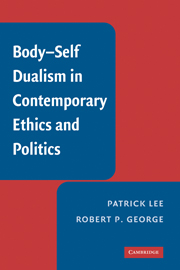1 - Human Beings Are Animals
Published online by Cambridge University Press: 27 July 2009
Summary
Is biological life an essential and intrinsic aspect of a human person or are our bodies merely extrinsic instruments? Stated abstractly, the question may seem rather distant from matters of ethics and public affairs. In truth, however, as we indicated in the introduction, it is logically connected to several morally charged political issues.
In this chapter we defend the position that human beings are living, bodily entities, that is, organisms, and indeed animals. The first argument we present is a development of Aquinas's argument against Plato's position on the relation of the soul to the body. The overall, main argument is as follows:
Sensing is a living, bodily act, that is, an essentially bodily action performed by a living being.
Therefore the agent that performs the act of sensing is a bodily entity, an animal.
But in human beings, it is the same agent that performs the act of sensing and that performs the act of understanding, including conceptual self-awareness.
Therefore, in human beings, the agent that performs the act of understanding (including conceptual self-awareness, what everyone refers to as “I”) is a bodily entity, not a spiritual entity making use of the body as an extrinsic instrument.
Each of these steps in the argument will be explained more fully. The main development, however, will occur in providing support for the first premise, since substance dualists as well as proponents of the no-subject view (the position that the person is not an enduring substance at all but is a set of experiences united by memory and other psychological connections) deny that premise.
- Type
- Chapter
- Information
- Publisher: Cambridge University PressPrint publication year: 2007



